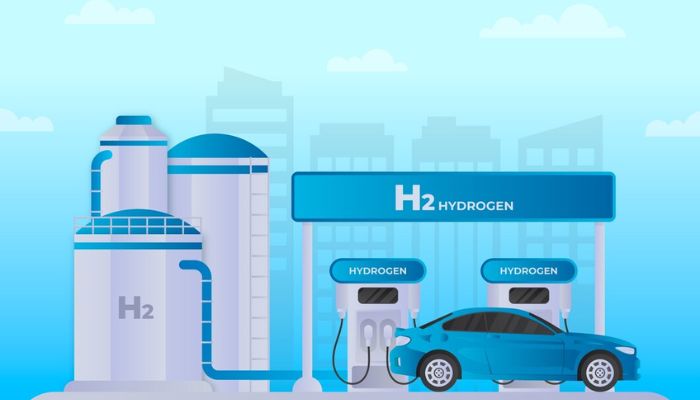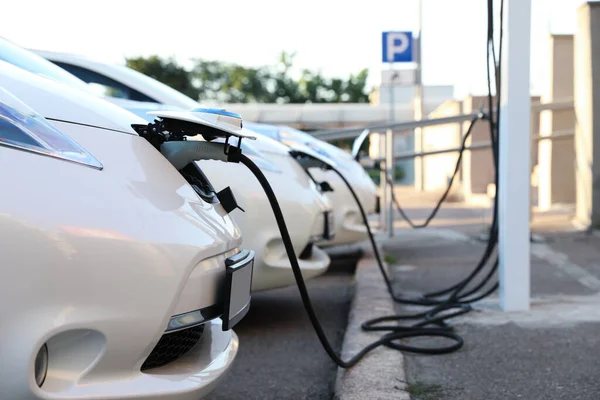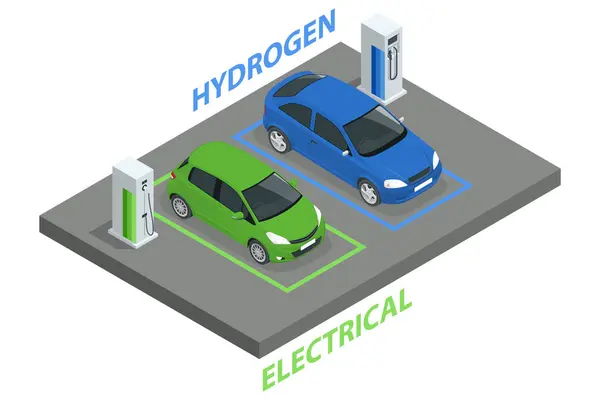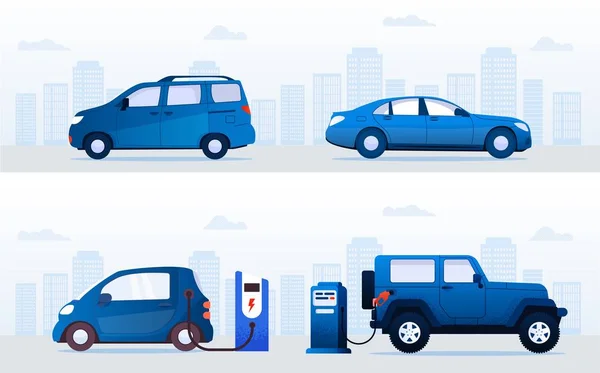As the world moves toward more sustainable transportation, two technologies are emerging as the front-runners: Hydrogen-powered vehicles (H2Vs) and fully-electrics (FEVs) vehicle categories.
Each has its merits and despite the current popularity of EVs, hydrogen cars are finally starting to get some attention. In this article, we are going to make a quick comparison of hydrogen cars and electric cars on different criteria to determine which one is preferable.
Table of Contents
ToggleWhat are Hydrogen Cars?

Hydrogen cars, also known as hydrogen fuel cell vehicles (FCVs), use hydrogen gas as a fuel source to generate electricity for powering an electric motor. Unlike traditional gasoline or diesel-powered vehicles, hydrogen cars produce no harmful emissions, as the only byproduct is water vapor. These vehicles are an eco-friendly alternative, contributing to reduced carbon footprints.
Hydrogen Cars Features
- Fuel Cell Technology: Hydrogen gas reacts with oxygen in a fuel cell to produce electricity, powering the motor.
- Zero Emissions: The only emission is water vapor, making it environmentally friendly.
- Fast Refueling: Hydrogen tanks can be refueled in 3–5 minutes, similar to refueling gasoline cars.
- Long Range: Hydrogen cars often offer ranges comparable to conventional cars, with some models exceeding 300 miles on a single fill.
- Quiet Operation: Powered by electric motors, these cars are quiet and smooth to drive.
What are Electric Cars?

Electric cars (EVs) are powered entirely by electricity stored in rechargeable batteries. These vehicles do not use traditional fuels like gasoline or diesel. Instead, an electric motor converts the stored energy into motion. Electric cars are gaining popularity for their efficiency, low operating costs, and environmental benefits.
Electric Cars Features
- Battery-Powered: Energy is stored in lithium-ion batteries, which power the motor.
- Zero Tailpipe Emissions: EVs produce no direct emissions, reducing air pollution.
- Charging Options: They can be charged at home, work, or public charging stations, although charging times can vary.
- Lower Operating Costs: Electricity is generally cheaper than gasoline, and EVs require less maintenance due to fewer moving parts.
- Regenerative Braking: Captures and stores energy while braking, improving efficiency.
- Variety of Models: Available in compact, sedan, SUV, and even performance models.
You can learn about the types of chargers for electric vehicles: J1772 vs CCS: What’s the Difference?
Electric vs Hydrogen Cars: Comparing Various Parameters

1. Power Source and Charging Method
The major difference between electric and hydrogen cars is based on their power supply and ways of recharging.
Electric Cars (EVs): These cars are electric vehicles, which means they draw power from batteries. They must be charged from an electrical outlet, which can take hours with a Level 1 charger or a Level 2 charger, but can get the car to about 80% in about 30 minutes with a Level 3 EV charger.
Hydrogen Cars (H2Vs): Hydrogen electric vehicles utilize hydrogen as fuel which is stored in cylinders of high pressure. These cars generate electricity in a fuel cell, which reconstitutes hydrogen into energy to drive the motor. It takes about 3-5 minutes to refuel this car at a hydrogen fueling station just like you refuel a car engine.
2. Range and Efficiency
EVs: The current average range of electric vehicles is between 150 and 370 miles available on a single charge. However, its values might be lower in certain cases due to unfavorable and severe climatic conditions and the constant use of air conditioners and heaters.
H2Vs: Some of the currently available hydrogen cars include Toyota Mirai and Hyundai Nexo which can drive between 300 to 400 miles with a full tank of hydrogen. Compared with electrical power, hydrogen fuel has greater energy density as such these cars can travel longer distances than many of the electrical powered vehicles in a single refueling.
3. Environmental Impact
EVs: Currently, electric cars do not need to be charged every night, and they are considered environmentally friendly. But this is only possible if the electricity used to charge the batteries is renewable. In areas where the grid is powered by coal or other non-renewable energy sources, the carbon footprint of electric cars can be higher. However, electric cars can be very environmentally friendly if charged using renewable energy.
H2Vs: Hydrogen cars are said to be eco-friendly because the only emission produced by them is water vapor. However, the usage of hydrogen as a fuel depends on how it has been prepared. Today, the majority of the hydrogen is produced using natural gas through the steam methane reforming (SMR) process which is carbon intensive. Hydrogen is completely green when it is produced through the electrolysis process using renewable power sources.
4. Infrastructure Availability
EVs: Charging stations are already in place with charging infrastructure for electric vehicles being available in millions around the world. No wonder that today owners of EVs can find charging stations from fast stations located in public places to home chargers.
H2Vs: Hydrogen fueling stations are much fewer in number when compared with EV charging stations. Today there are fewer than 700 hydrogen stations globally, although a large concentration of them is found in California, Japan, and some European countries. One of the key barriers to the use of hydrogen vehicles is the availability of support structures such as production facilities.
5. Cost and Maintenance
EVs: The costs associated with running electric cars are lower than most hydrogen cars. They have fewer parts that tend to get worn out than the normal cars and because there is no exhaust, there are few problems with repairs. Electric vehicles cost less than they used to, but they may be pricey at first.
H2Vs: Hydrogen cars are often costly because the equipment used in generating fuel cells is more complicated while tanks used to store hydrogen are costly. Variable costs of hydrogen cars also include relatively high costs for maintenance and rebuilding, due to the use of hydrogen-reactive materials and the construction of refueling stations.
Hydrogen vs Electric Cars: Which One Is More Sustainable?

In terms of sustainability, hydrogen too and electric vehicles are somewhat relative and against each other.
- EVs and Sustainability: Electric cars are deemed extremely sustainable particularly since these cars can be charged using solar, wind, or hydroelectric power. This makes them ideal for the future because they have a straightforward powertrain and there is increasing progress in battery recycling.
- H2Vs and Sustainability: Hydrogen cars can even be more sustainable in some cases than battery-powered cars. As long as hydrogen is produced from renewable sources (green hydrogen), it can offer a zero-emission alternative with the potential to complement renewable energy systems. Hydrogen also plays a crucial role in heavy industries, like shipping, aviation, and trucking, where battery technology may not be as effective.
- Energy Storage and Flexibility: One of hydrogen’s big advantages over electric vehicles is its storage ability for longer periods. Hydrogen can be used as an energy storage medium for seasonal or grid energy balancing, especially in areas where solar or wind power generation is intermittent. This could allow hydrogen to help solve some of the problems of renewable energy storage that electric cars cannot address alone.
Will Hydrogen Cars Replace Electric Cars?
Hydrogen cars are unlikely to fully replace electric cars, as EVs are more efficient and easier to charge. However, hydrogen may complement EVs in certain industries like heavy transport.
While hydrogen cars offer faster refueling, longer range, and zero emissions, the lack of infrastructure and the complexity of hydrogen production and storage mean they won’t completely replace electric cars. Instead, they will likely coexist, with electric cars dominating urban areas and hydrogen vehicles being used for long-range and heavy-duty applications.
Electric vehicles will remain popular for short-to-medium trips, while hydrogen cars might dominate long-haul trucking, buses, and other commercial applications. Both technologies will benefit from ongoing research and development, making them increasingly viable for different segments of society.
Conclusion
When choosing between hydrogen and electric vehicles, both have their unique benefits and challenges. EVs are already widely adopted and have better infrastructure, while hydrogen vehicles offer longer range and quicker refueling. The future of sustainable transportation will likely involve a mix of both technologies, each excelling in their specific use cases.
If you’re looking for a future-proof, sustainable solution for your transportation needs, it’s important to keep an eye on developments in both electric and hydrogen technologies.
For cutting-edge solutions to power your electric vehicle fleet, trust MoreDay. They offer efficient, eco-friendly EV charging systems designed to help businesses and individuals make the switch to a cleaner, greener future. Visit their website to learn more!
Related reading: How much to install an EV charger at home?

